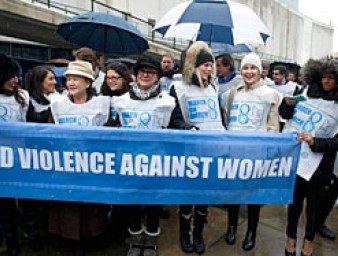Women’s rights body rules on Kell v. Canada complaint
16 July 2012

The UN Committee on the Elimination of Discrimination against Women ruled in favour of Cecilia Kell, an indigenous Canadian, in her complaint on discrimination against Canada.
In 1990, Cecilia Kell, an aboriginal woman from the Northwest Territories, returned to her community of Rae-Edzo after attending college. The mother of three had left her children in the care of relatives, hoping to be reunited with them once she had established herself and secured a home for her family.
When the local housing authority made lodging available to indigenous people under a special scheme, Kell decided to apply. She was living with her partner, one of the Directors of the Housing Authority Board at the time who, once hearing of the scheme, attempted to apply in his own name. After his application was rejected because he was not a member of the Rae-Edzo community, the housing authority advised Kell to list both herself and her partner in her application. This proved successful as a house was assigned to them as co-owners.
Over the three years that followed the acquisition Kell experienced spousal abuse and her situation worsened when she got a job and became financially independent.
In 1993, the Northwest Territories Housing Corporation, the state agency administering the earmarked properties in the locality, removed Kell’s name from the Assignment Lease at the request of her partner and without her knowledge or consent. Two years later, Kell was evicted from her home by her partner.
Over a period of ten years Kell fought to regain her property rights through the Canadian legal system. She filed three consecutive suits with different legal aid lawyers assigned to each case. Shortly after the first suit, Kell’s former partner was diagnosed with cancer and died before the end of her legal battle. By the time she filed the third action, the property had been sold by her partner’s estate.
In 2008, contending that she had exhausted all domestic remedies, Kell filed an individual complaint* against Canada through the UN Committee on the Elimination of Discrimination against Women, claiming to be the victim of violations of a number of articles of the Convention on the Elimination of All Forms of Discrimination against Women (CEDAW).
The complaint registered by Kell claimed, in particular, that Canada had “failed to ensure that its agents refrain from engaging in any act or practice of discrimination against women, when they removed [Kell’s] name from the lease without her consent.”
“She […] submits that the State party has contravened article 16, paragraph 1(h),of the Convention as it failed to ensure that its agents afford the same rights to her in comparison to her partner’s rights in respect of ownership, acquisition, management, administration and enjoyment of the property.”
The Committee concluded that Kell’s property rights had been prejudiced due to a public authority acting with her partner, and that she had been discriminated against as an aboriginal woman. The Committee also found that Canada had failed to provide Kell effective legal protection when she sought to regain her property rights.
The Committee established that Canada, as party to the Convention and its Optional Protocol, had failed to fulfil its obligations under articles 1, 2 and 16 and that it should provide monetary compensation and housing matching what Kell was deprived of. The Committee also recommended recruiting and training more aboriginal women to provide legal assistance, as well as review Canada’s legal system to ensure that aboriginal women victim of domestic violence have effective access to justice.
* Five of the human rights treaty bodies (the Human Rights Committee, the Committee on the Elimination of Racial Discrimination, the Committee against Torture, Committee on the Elimination of Discrimination against Women and the Committee on the Rights of Persons with Disabilities) may, under particular circumstances, consider complaints or communications from individuals who wish to complain about the violation of their rights.
16 July 2012

VIEW THIS PAGE IN:



